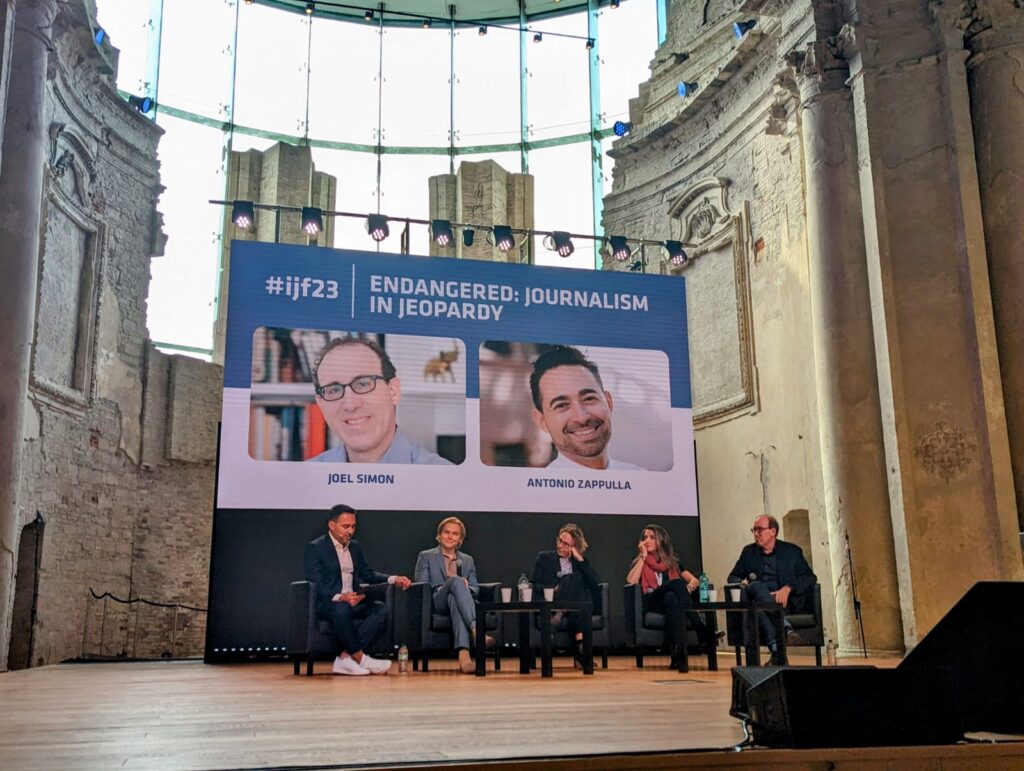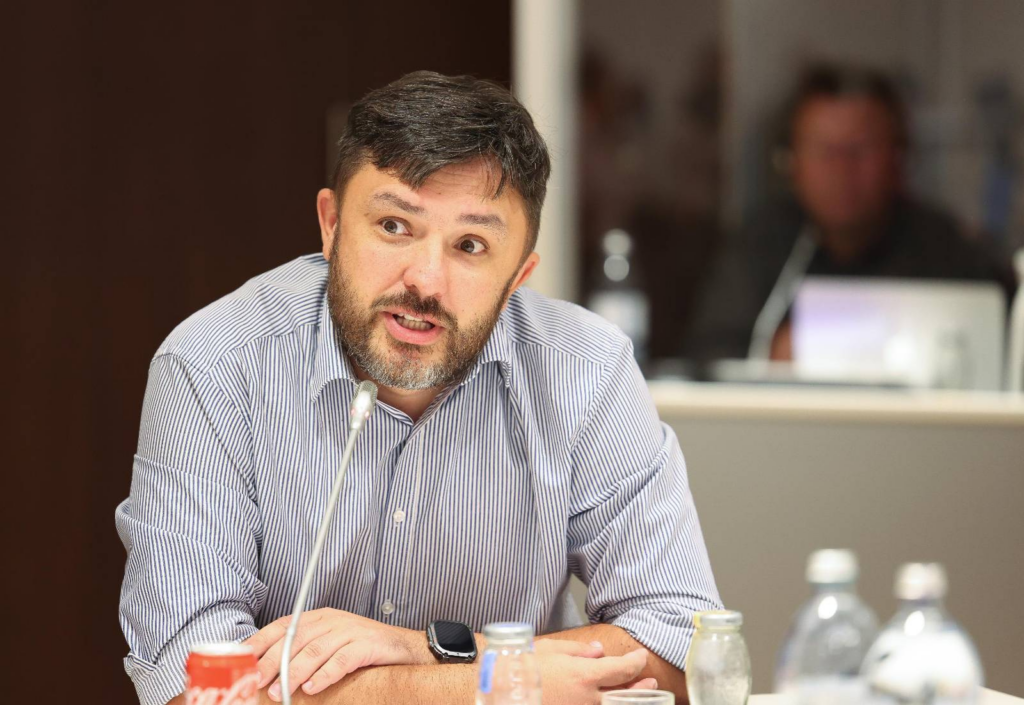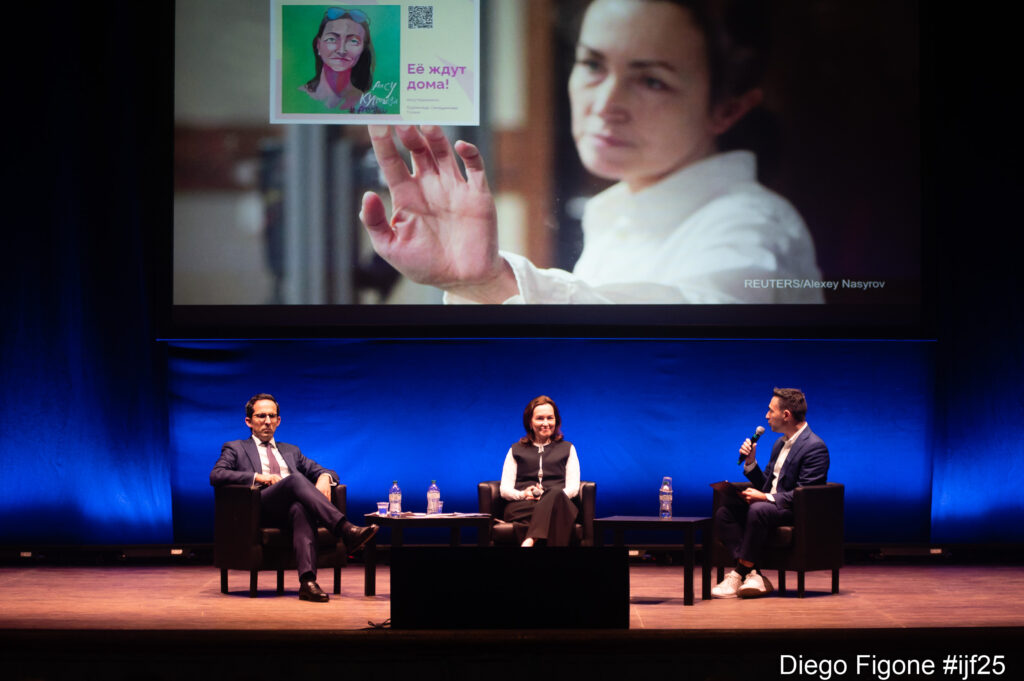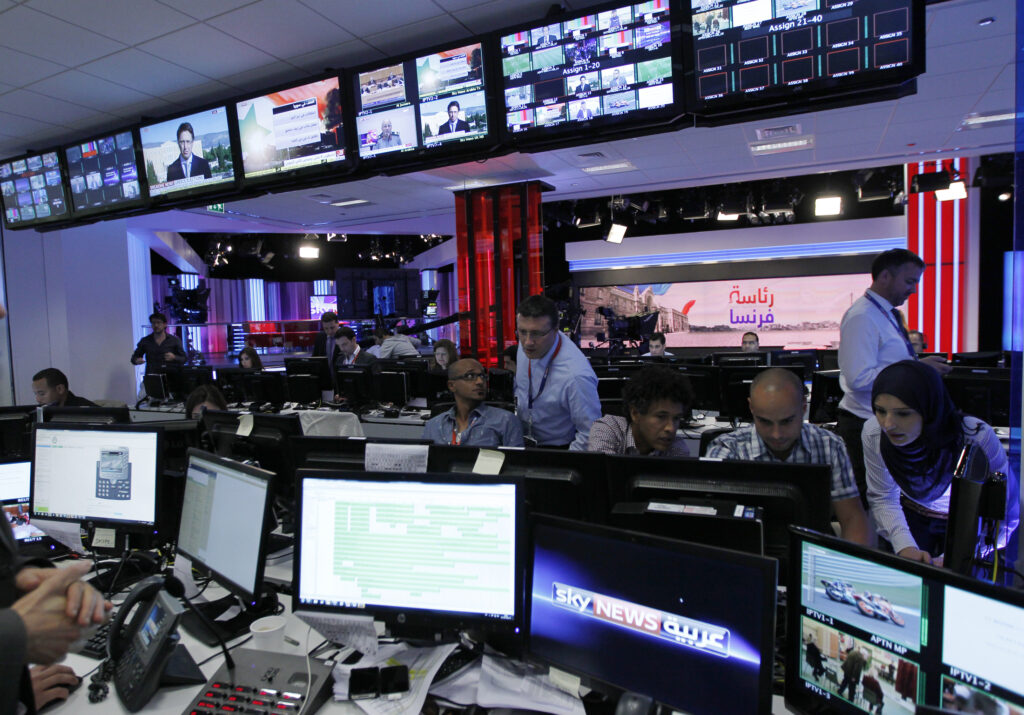
It was a huge honour to speak at this year’s International Festival of Journalism in Perugia, and to be amongst so many leading lights in the profession. From the impact of AI on journalism to how we must combat legal threats to press freedom – here are five highlights from the festival.
- Fuelling distrust in media is a powerful political weapon to dismantle democratic institutions. Journalists need to fight back.
We know that journalists can become the enemy when holding power to account. But what is the impact of independent news reporting in countries when the audience it serves simply do not believe it’s the truth? Press Freedom hero Carlos Dada, Co-founder and Director of Central American digital news outlet El Faro, spoke of the challenges he faced in exposing corruption and organised crime in El Salvador during the presidency of Nayib Bukele, whom 90% of the El Salvadorian population support. In a powerful conversation with Deputy Director of the International Press Institute Scott Griffen, we learnt how Carlos and his team have battled multiple politically motivated lawsuits, smear campaigns, surveillance, and threats to personal safety – all aimed at silencing El Faro’s reporting. Meanwhile the vast majority of the country’s citizens buy into state-run propaganda that makes a hero of the President and demonises the press. “I often think the healthiest thing would be to quit. But silence is not an option if we stay,” said Carlos. “When we are under harassment, we do have agency. We need people to know that the press aren’t paralysed.”
The argument for fighting fire with fire is strongly shared by media and human rights lawyer Caoilfhionn Gallagher KC, of Doughty Street Chambers. She told a packed auditorium during a separate panel discussion on countering the weaponisation of the law that journalists needed to be able to use the same ‘lawfare’ tactics against the perpetrators as were being used to silence them. “The enemies of press freedom are creative. We have got to get creative to defend and counterattack,” she said. Spotlighting abuses of the law that criminalise journalists is also key, according to Jodie Ginsberg, President of the Committee to Protect Journalists (CPJ). “We need to be vocal in our defence of journalism and journalists to push back against these repeated smears,” she said.
However, we shouldn’t assume that everyone sees the value of independent journalism in making decisions about their own lives. According to the Reuters Institute for the Study of Journalism’s (RISJ) Trust in News Project that examines trust in digital news in the key markets of Brazil, India, the United Kingdom, and the United States, 50% of those surveyed in Brazil, for example, believe journalists manipulate the public to serve their own agendas. “When powerful leaders use that rhetoric, they find an attentive audience,” said Eduardo Suarez, Head of News at the RISJ. “The decline of trust in media and attacks on journalists are two sides of the same coin,” Elodie Vialle, of the Berkman Klein Centre for Internet and Society, told a captive audience.
- There are humans behind AI, and we still have power.
The rapid advancement in AI, such as generative language models, has catalysed new fears that the future of the profession is at risk. This was a hot topic of the conference, mentioned across panels and audience questions as the idea of technological innovation intersected with issues related to sustainability, trust, disinformation and power.
However, Lisa Gibbs, Director of News Partnerships at Associated Press (AP) urged us to see the capacity for AI to support “augmented – rather than automated – journalism”. It is less an issue of a loss of control, and more a matter of education. Gibbs cautioned that many newsrooms are rushing into things they don’t understand or have the infrastructure for because of the perceived pressure to urgently integrate AI to their work – “particularly for smaller newsrooms that have a less established culture of innovation and experimentation”. AP’s recent survey of 200 US-based news organisations confirmed that AI is generally not yet widely in use among smaller newsrooms, and that ‘experimentation with AI and automation technologies requires the capacity of staff, a strong foundation with current technology, time and money.’ Fellow panellist Chris Moran, Head of Editorial Innovation at the Guardian, echoed the urgent need for in-depth staff training about AI, rather than a focus on how it can be most immediately deployed within the newsroom.
A dangerous tendency for us to anthropomorphise technology, multiple experts cautioned their audiences, leads us to forget that it is humans who are implementing this technology. “AI is not good or bad,” said Uli Koppen of Bayerischer Rundfunk, “it’s about how we use it.” It is people who are training and iterating AI-based programmes through providing datasets for them to learn from, and people who are applying these programmes to their work. We design the tasks it is assigned to, and “it is our human values that become incorporated into AI”, said Nick Diakopoulous of the Computational Journalism Lab at Northwestern University.
An appropriate infrastructure and ethical framework by which to govern the application of AI is therefore increasingly urgent and essential, said Uli Koppen and Adeline Hulin at UNESCO. UNESCO recently launched a report on the missing links in AI governance and AP has worked on an AI framework that mirrors many of the ethics and values applied to their usual editorial work. The time for the media ecosystem to rally together to lobby for a cross-sector solution is now.
Moran ended on a positive note, reminding us that while the impact of AI on media will be significant, we must remember that “the essential purpose of journalism is to bear witness to what is happening in the world around us.” Without prompts to programme it, generative AI cannot fill that role.
- We need to counter audience desensitisation when reporting on climate issues
During a discussion moderated by our own Editor-in-Chief Yasir Khan, we heard how climate change is still being covered as a ‘niche’ topic because many audiences still believe it’s an abstract problem. Others become disengaged from the focus on a litany of climate emergencies. Journalists need to get smarter about bringing to life the way in which climate underpins and intersects the critical issues of today. Abigail Edge, senior newsroom strategy consultant at Fathm, raised the challenge journalists face in making climate change breaking news when it’s a problem that’s always there. “We need to find new angles. We should encourage open communication and collaboration. Everyone can learn from experts when it comes to reporting on climate,” she told us. This was emphasised by Meenakshi Ravi, from Al Jazeera English, who added: “We need both the specialists and the generalists when it comes to climate reporting. If we really want journalism to connect, send it to grassroots organisations who understand the community. Offer it as a resource.”
Speaking to a packed room, TRF’s new Inclusive Economies Editor Amruta Byatnal – who’ll be joining our team of reporters on our recently launched news platform
More News
View All
AI Company Data Initiative drives transparency on corporate AI adoption
Now open for company…
Read More
Winners of the 2025 TrustLaw Awards Announced
This week marks the announcement of the 2025 TrustLaw Awards winners,…
Read More
How the Foundation is supporting LGBTQ+ communities worldwide
Over the last year, the Foundation has…
Read More
World Press Freedom Day: the need for the equitable and ethical adoption of AI
AI will be…
Read More
Case study: How an exiled Russian newsroom is using AI to combat news fatigue
Our Media in…
Read More
Five takeaways from the 2025 International Journalism Festival in Perugia
Remarkable solidarity…
Read More
How ‘foreign agent’ laws are silencing independent media
We explore the growing threat of ‘foreign agent’…
Read More
Unpacking the regional trends of the Index of Pro Bono 2024
We take a look at the long-term trends on pro…
Read More
2024 Index of Pro Bono findings revealed
The 2024 Index of Pro Bono, compiling comprehensive data representing nearly…
Read More
Journalists cautiously optimistic about the effect of AI on the profession, our new report finds
Our new TRF Insights report sheds light on the opportunities and challenges of AI…
Read More

